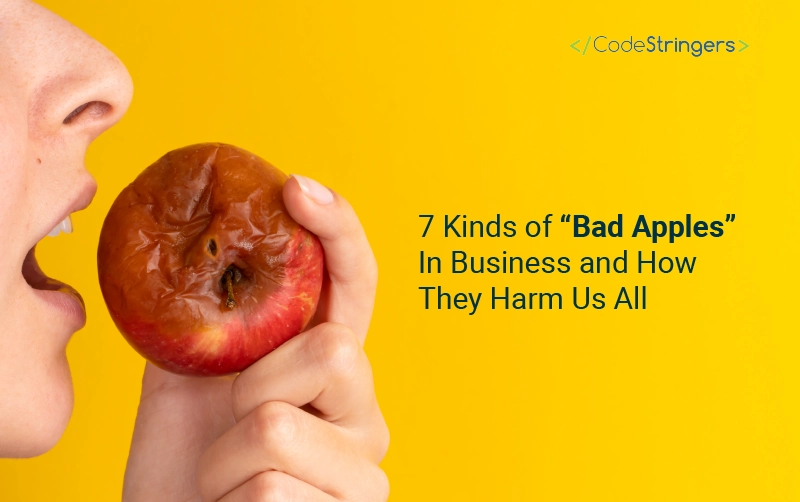This week’s This American Life episode really got me thinking. It’s a story about a guy named Ken who unknowingly stumbled into the NFT gold rush. Ken was working a regular job at Amazon, and in his spare time, he created a site called Pixelmap. He built it to practice a new programming language. Ken forgot about it until he was contacted by an online influencer named Adam McBride, who informed him that Ken had created one of the first NFT sites in history. Consequently, he was sitting on millions of dollars worth of digital real estate. From there, high jinks ensue. With so much money at stake, Ken agonizes over who he can trust among the myriad scammers in start-ups.
You may want to read: Release Planning and Honest Bidding
However, The problem is that the receiver of that message has probably received five similar marketing messages that day, and three of them are probably bad apples– either start-up scammers or incompetents who will cause more harm than good.
Who are these start-up scammers and what kind of harm do they cause?
| Type | How To Spot One | What’s Their Angle? | Harm Caused To The Rest of Us |
| Mr. Faux Investor | They put “Start-up Investor/Advisor” (or something to that effect) on their LinkedIn profile. | Similar to the Faux Investor they say they want to help you grow your business and get you more customers. The Growth Hacker will also ask for a percentage of your business and a cash payment. They, also, will probably do nothing other than tell you to do more social media posts. | Demotivates new entrepreneurs. Even if you don’t fall for the scam, it can be soul-crushing to even be selected as a “mark”. |
| The So-called Growth Hacker | They show you a resume of businesses that they supposedly brought from obscurity into a household name. The word “ninja” appears somewhere in their LinkedIn profile. Perhaps they worked for 1-2 years as a digital marketer somewhere but haven’t had a steady job in a while. | Similar to the Faux Investor they say they want to help you grow your business and get you more customers. The Growth Hacker will also ask for a percentage of your business and a cash payment. They also will probably do nothing other than tell you to do more social media posts. | Makes it near-impossible for honest freelance marketers to survive. |
| The Litigious Slacker | When you google them their name shows up as a plaintiff in multiple lawsuits. | They apply for jobs at startups that can’t afford HR departments. Then when they get hired, they intentionally get themselves fired so that they can file wrongful termination suits. | Causes startups to be overly cautious on hiring decisions, makes them less likely to hire outside of their own personal network– which contributes to equity gaps. |
| The All-Sizzle-No-Steak Marketer | These are the guys who send you the most unsolicited marketing messages. | They focus more on selling than on delivering. So instead, they message as many people as they can, as often as they can. They figure that if they cast a wide enough net, eventually they’ll catch something. | Makes prospective clients tune out all marketing messaging, makes them less likely to hire outside of their own personal network. |
| The Lowballing Outsourcer | When you’re looking to outsource a project, they give you an enticingly low bid for your project before they know exactly what it entails. | They win a bidding contest by providing you with the lowest bid, then once they win the deal, they hit you with expensive change orders once they learn what the project actually is. This is based on the assumption that once you’ve locked into a vendor, you’ll probably stick with them for a while, even if they nickel-and-dime you to death. | Causes honest service providers to lose business. Incentivizes dishonest behavior in bidding. |
| The Idea Vampire | VC’s or investors who drag out the pitch process longer than normal. You get a “creepy feeling” from them. | They steal your ideas. Shamelessly. This situation was parodied hilariously in HBO’s Silicon Valley. | Adds an additional level of discomfort to all pitch meetings. |
| The Ax-Grinder | Execs have big personalities and middle management is afraid to make decisions. | They focus on fulfilling personal agendas and proving themselves to be right. Winning is more important than finding a win-win solution. | Working with them will increase your employee turnover. |
Perhaps in a future post, I’ll devise some solutions on the best way to handle the aforementioned scammers in start-ups. For now, however, I just wanted to raise awareness. We all should unite in our best efforts to keep these bad actors from causing any more harm to honest members of the business community.
Christian Schraga












